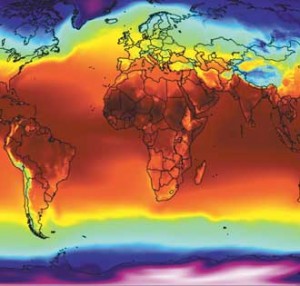 A crash course in climate change data
A crash course in climate change data
Have you ever found yourself wondering where all the climate change statistics people use in their green arguments, like Al Gore did in An Inconvenient Truth, actually come from? Are you curious about how those figures are generated? OK, so you may know that the “data” comes from complex, expensive, computer-driven global climate change models, but did you know that there are many models and their predictions may vary? And, how can we interpret the output of these models on a regional scale when they produce a single data point for an area the size of New Brunswick?
By addressing all of these points and then some Understanding Global Climate Models: Basics for the Non-Climate Scientist, aims to give academics, NGOs and policy-makers a better appreciation of the science of climate prediction and its utility across all disciplines. This crash course in climate change models is presented by the Global Environmental and Climate Change Centre (GEC3) a cross-disciplinary, multi-university research centre bringing together more than 40 researchers from six Quebec universities to study processes, modeling and impact of environmental and climate change.
Understanding Global Climate Models: Basics for the Non-Climate Scientist, a free lecture series offered Mondays and Wednesdays, Jan. 12-28, 4 – 5:30 p.m. room 306, Burnside Hall. To register or for more information, email angela.mansi@mcgill.ca
Cutting edge lectures begin
The Royal Society of Canada and McGill have teamed up to present the Cutting Edge lectures, a four-part, monthly series created with the express purpose of fostering communication between scientists in different disciplines as well as between scientists and the public. The first lecture in the series is by University of Toronto Geology professor and author Dr. Andrew D. Miall titled Energy and climate change: Six popular myths that complicate the development of good public policies. Dr. Miall will discuss the downside of simplifying complex scientific or economic issues related to climate change to help the public better understand them.
Cutting Edge Lecture Series, Dr. Andrew D. Miall, Thursday Jan. 8, 6-8:30 p.m.; Redpath Museum Auditorium, 859 Sherbrooke St. West. Admission is free, open to the public. A wine and cheese reception will follow the lecture. For more information contact Ingrid Birker at Ingrid.birker@mcgill.ca or 514-398-4086 ext 4094.
Setting the table for a new zine….CuiZine!
When it comes to Canadian food, most of us know about regional specialties like tourtière and fèves au lard from Quebec, P.E.I mussels, and Saskatoonberry jam. But is there such a thing as Canadian cuisine, and if so, what is it? The answer may be in the cultural hybrids created when the different parts of the Canadian mosaic come together in dishes like sushi pizza, Lahmajoun “sandwiches” and Churrasco chicken. You can find these recipes, how and why they were created, and much more about food in Canada in McGill’s CuiZine: The Journal of Canadian Food Cultures / Revue des cultures culinaires au Canada, a new peer-reviewed e-journal that aims to nourish intellectual exchanges on the subject of food in Canada from multicultural perspectives.
Destined for both academic and general audiences, CuiZine provides an innovative academic forum for interdisciplinary discussions surrounding the diverse culinary cultures of Canada. It also provides a venue for dynamic creative content on the subject, featuring original creative pieces such as poetry, short fiction, and visual essays on eating and cooking in Canada. Its contents could include an historical examination of first generation Sri Lankan immigrant foodways in Toronto, a nutritional analysis of children’s lunchboxes in neighbourhood schools, a socio-economic study of seal hunting in Nunavut, or a literary analysis of Duddy Kravitz’s smoked meat escapades. In its inaugural issue, you’ll find, among other things, a video recipe for Canadian Shield Shortbread Cookies that puts quite a spin on a traditional Christmas culinary classic.
CuiZine may be found online only at: www.cuizine.mcgill.ca.
The Montreal launch party for CuiZine will be held on Jan.14 at 12 p.m. at McGill’s Institute for the Study of Canada, 3463 Peel Street. All are welcome, but please RSVP by Jan. 12 at misc.iecm@mcgill.ca or 514-398-8346.
The Great Debate
McGill’s Desautels Faculty of Management is set to host one of the oldest and most prestigious parliamentary debating tournaments in the world. The McGill Winter Debating Carnival, organized by the McGill Debating Union since 1950, regularly welcomes some of the world’s best debaters – the 2008 event featured former national, North American and world champions. The 60th edition will feature 64 two-person teams from around the world competing in six preliminary rounds followed by playoffs. A pre-tournament party will take place on Thursday Jan. 15. Other events, including a banquet at Molson Breweries on Saturday night and a smoked meat lunch on Sunday, are planned.
McGill Winter Debating Carnival 2009, Jan. 16-18, Desautels Faculty of Management, Bronfman Building, 1001 Sherbrooke Street West, Montreal. The public is welcome. For more information email the event’s organizers at mcgill.wintercarnival@gmail.com
Freaky Fridays gets all wet
The Redpath Museums’s 2009 Freaky Fridays series kicks off Jan. 16 with the lecture Global Meltdown, a presentation on the realities and potentially disastrous consequences of glacial melting, by professor Jeff McKenzie from the Department of Earth and Planetary Sciences. The lecture will be followed by a showing of the equally disastrous, 1995 Kevin Costner epic, Waterworld.
Freaky Fridays lecture, Redpath Museum Auditorium, 859 Sherbrooke Street West. Admission is free. For more information contact Ingrid Birker at Ingrid.birker@mcgill.ca or 514-398-4086 ext 4094.
